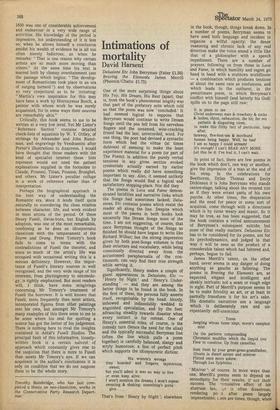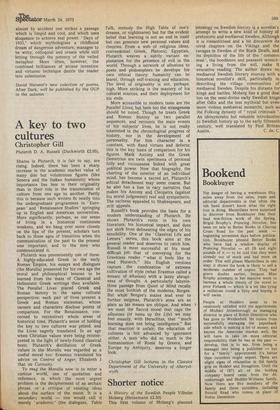Intimations of mortality
David Harsent
Delusions Etc John Berryman (Faber £1.50) Braving the Elements James Merrill (Phoenix/Chatto £1.75) One of the more surprising things about His Toy, His Dream, His Rest (apart, that is, from the book's phenomenal length) was that part of the prefatory note which told us that the poem was now 'concluded,' It had seemed logical to suppose that Berryman would continue to write Dream Songs until the pen fell from his nerveless fingers and the unnamed, wise-cracking friend had the last, unrecorded, word. For one thing, the poet had devised a syntactic form which had the virtue (at times dubious) of seeming to make the least experience material for a poem (or part of The Poem); in addition the purely verbal tensions in any given section evoked credentials actually earned by earlier poems which really did have something important to say. Also, it seemed unlikely that the Songs would find a logical and satisfactory stopping-place. Nor did they The poems in Love and Fame demonstrated lucidities and narrative links which the Songs had sometimes lacked; Delusions, Etc contains poems which resist the reader all along the line. Despite which most of the poems in both books look uncannily like Dream Songs most of the time. I am not suggesting, of course, that once Berryman thought of the Songs as finished he should have begun to write like Richard Wilbur; but the strong impression given by both post-Songs volumes is that their structure and vocabulary, while being consciously directed away from the accustomed paraphernalia of the continuuum, can only find their true strength while serving it.
Significantly, Henry makes a couple of guest appearances in Delusions, Etc — 'Henry by Night' and ' Henry's Understanding' — and they are among the better things to be found in the book. In the first of these, the persona fully asserts itself, recognisable by the head: bloody, unbowed and indissolubly wedded to anguished speculation, and by the feet: advancing steadily towards disaster when every instinct is for retreat. One of Henry's essential roles, of course, is the comedy turn (hence the need for the alias) and the typically successful Berryman line (often the line which pulls a poem together) is carefully balanced, slangy and wryly humorous; a line of perfect pitch which supports the idiosyncratic diction: His women's wrongs they hoarded and forgave, mysterious,
sweet; but you'll admit it was no way to live or even keep alive.
I won't mention the dreams I won't repeat sweating & shaking: something's gotta give . . . .
That's from 'Henry by Night '; elsewhere in the book, though, things break down. In a number of poems, Berryman seems to have used both language and incident to organise a wilful opacity; the dense reasoning and chronic lack of any real direction make the voice sound a little like that of a philosopher with a speech impediment. There are a number of prayers, following on from those in Love and Fame, in which humility and regret go hand in hand with a stubborn worldliness — a combination which produces tensions at about the same rate as confusions, and which leads to the outburst, in the penultimate poem, in which Berryman's conflict with himself (and latterly his God) spills on to the page still raw: It is plain to me
Christ underwent man & treachery & socks
8e lashes, thirst, exhaustion, the bit, for my
pathetic & disgusting vices, to make this filthy fact of particular, long after, faraway, five-foot-ten & moribund human being happy. Well, he has!
I am so happy I could scream!
It's enough! I can't BEAR ANY MORE.
Let this be it. I've had it. I can't wait.
In point of fact, there are few poems in the book which don't, one way or another, give the impression of a man at the end of his strap. In the celebrations for Beethoven, Dylan Thomas and Emily Dickinson it is John Berryman who stands centre-stage, talking about the revered trio as if they were errant parts of his own psyche. At other times, the desperation and, the need for peace or some sort of acquittal, come through with a directness which is by turns weary and manic. So it may be true, as has been suggested, that the book contains a veiled announcement of Berryman's subsequent suicide; but none of that really matters. Delusions Etc has to be considered, for its poems, not for its psychodynamics, and judged in that way it will be seen as the product of a considerable talent which had faltered and, perhaps, begun to fail.
James Merrill's talent, on the other hand, never seems in any danger of doing anything as gauche as faltering. The poems in Braving the Elements are, as expected, elegant and intelligent and sleekly intricate: not a seam or rough edge in sight. Part of Merrill's purpose seems to be to make frivolity an art, or at least to partially transform it for his art's sake. His dramatic narratives use a language which is deliberately rare and unrepentantly self-conscious:
Tones
Jangling whose tuner slept, moon's camphor mist On the parterre compounding
Chromatic muddles which the limpid trot Flew to construe. Up from camellias Sent them by your great-great-grandfather, Ghosts in dwarf sateen and miniver Flitted once more askew. Through Les Sylphides . . .
' Miniver ': of course. In more ways than one, Merrill's poems seem to depend on serendipity for their results, if not their success. The -iimulative effect of his abstruse len, ,ge is often disastrous, rendering po, n after poem largely impenetrable; t. 'ere are times, though, when almost by accident one strikes a passage which is limpid and cool, and which uses eloquence to achieve real power. Days of 1931,' which mythologises a childhood dream of dangerous adventure, manages to be witty, colloquial and ornate while still letting through the potency of the veiled metaphor. More often, however, the combined brilliances of arcane invention and virtuoso technique dazzle the reader into submission.
David Harsent's new co/ection of poems, After Dark, will be published by the OUP in the autumn



































 Previous page
Previous page